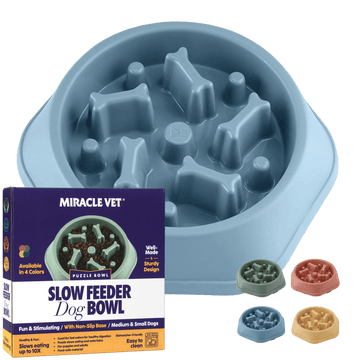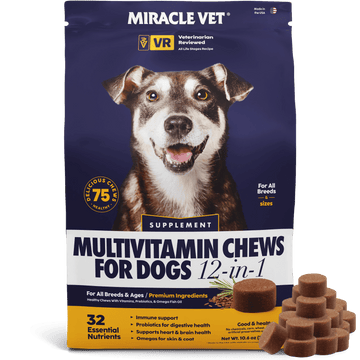Getting a new Puppy is exciting! You have found the perfect puppy, they are all cute and cuddly and you can’t wait to bring them home, but do you know everything you need to know about your new best friend?
At Miracle Vet we work with Veterinarians to keep your dog happy and healthy, so we found out what questions Vets recommend you should be asking about your new puppy.
What do you need to know about your new puppy?
Vets will always want you to understand as much about your puppy as possible. You should be aware of the breed and how big your puppy will grow. Taking on a new Puppy is a commitment to this dog for its entire life so before bringing your puppy home you need to understand the commitment to their health and lifestyle.
What you need to ask about your Dog
10 Questions you should be asking about your puppy:
Does My Dog need Parasite medication?
Vets recommend that preventative parasite medications are used. Heartworm, and other parasites, can infect your dog causing health issues such as heart failure and lung disease.
It isn’t only your dog that is at risk, parasites such as nematode worms can be transmitted to people and children can be very susceptible.
Prevention medication is cheap and easy and can be part of a veterinary plan.
How do I care for my dog's teeth?
When you first get your puppy it is likely that they will be in a chewing stage.
This will be most obvious as they are losing their puppy teeth and adult teeth are coming through. Frustratingly, this may apply to chewing shoes, furniture and toys, but this is also a good time to adopt a good dental routine with dental dog chews and dog toothbrushes.
Your Vet will also be able to periodically remove plaque build up and tartar and if your dogs ‘dog breath’ is particularly bad, this could be a sign they need additional cleanings.
Ongoing dental care and plans will prevent dental issues in your dog and also the secondary health problems this can often lead to.
Should I vaccinate my puppy?
Vaccinations can often be a conflicting topic, however most Vets will agree that vaccinating your dog is a good idea.
Some states will expect you to keep up to date with certain vaccinations or face prosecution as preventable illnesses such as rabies can cause a wider health problem, not just to your own dog.
When choosing a vaccination schedule it is worth talking to your Vet and setting up a schedule of vaccinations they recommend and are needed. You can talk through the pros and cons of each and make sure you are happy with the plan.
Dogs respond differently to vaccinations than humans, but like humans we wouldn’t recommend having vaccines if your dog or puppy is battling an illness. Vaccines will still affect the immune system so give your dog a better resistance by only vaccinating them while they are fit and healthy and the immune system is not under any stress.
Could my Puppy have a serious disease?
If you are buying a puppy from a breeder you can do your due diligence into the parents and health of your puppy, however even if your dog's parents have no illness or disease your dog could still have a congenital disease that is underlying.
Most breeders will make you aware of any health problems they know about, but they may not know.
If you are getting your puppy from a rescue then you will have less information about their health history and family health. This doesn’t mean they will have a health condition but just means you won’t be informed of any potential risks.
As with any animal you will not know for sure unless you take them for a full examination with a vet. A health check when you first get your puppy will include an external exam, checking skin, checking for any parasites, checking faecal matter. You can opt for a fuller exam that may include bloods and heart scans but this will be dependent on your insurance and vet. They usually won’t recommend extensive testing unless they have found something in the initial tests.
Early identification of any issues will help you manage your dog’s health. If something is flagged and you bought from a breeder then you should let them know in case there is a hereditary risk. Some breeders also offer limited health guarantees.
What food should I give my Puppy?
Your dogs nutrition is very important, as a puppy they will need a higher protein and calorie puppy food to help them grow healthily. However as they grow you will need to pay attention to their weight and coat and switch to an adult dog food to prevent them gaining too much weight which can cause health issues.
When choosing a dog food pay attention to the ingredients, avoid preservatives and additives and make sure the dog food is complete and balanced. Dog supplements that helps promote good immunity and health are very important.
When changing your dogs food make sure you pay attention to any changes in their bowels and skin, if they develop a rash or diarrhoea it may be a sign of a food allergy.
Puppies will need a lot of vitamins as they grow and typically they will need more calories than an adult. As they grow you should monitor portion control to make sure they do not become overweight or obese.
Understanding your breed of dog will help you get the right balance of food and monitor their weight gain. Your vet will be able to help you plan out the correct calories and balance based on a BSC (Body Condition Score).
When should I Spay/Neuter my puppy?
If you are not planning on breeding from your dog then there are many benefits to spaying/neutering your pet.
Spaying or neutering your dog can help with training and discipline, a neutered male dog will be less likely to run off or roam and therefore less likely to get lost or hurt.
A spayed bitch means they have a lower chance of uterine infections and is a preventative measure against breast cancer. Neutering your male can also prevent testicular cancer and prostate problems.
Vets recommend the best time to spay or neuter your dog is before they reach sexual maturity, this can be different in different breeds or dogs but usually around 6 months is a good time to spay or neuter. This is usually before a female will go into season.
However, for some breeds of dogs there are advantages to waiting a little longer so you should consult your veterinarian.
How often should I take my dog to the Vet
When you first get your puppy, you should see your vet for an initial examination and health evaluation. This will be a good opportunity to discuss health, dental or vaccination plans. In the first 6 months you will arrange to see your vet in accordance with these plans.
After your dog is mature you may want to visit your vet for a health check every 6 months or at least once a year. This is just to check basics such as weight, teeth and overall condition and it may coincide with vaccination boosters.
If your dog is hurt or sick you should always see a vet as soon as possible for an emergency appointment.
For more tips on looking after your new puppy, sign up to our newsletter.









